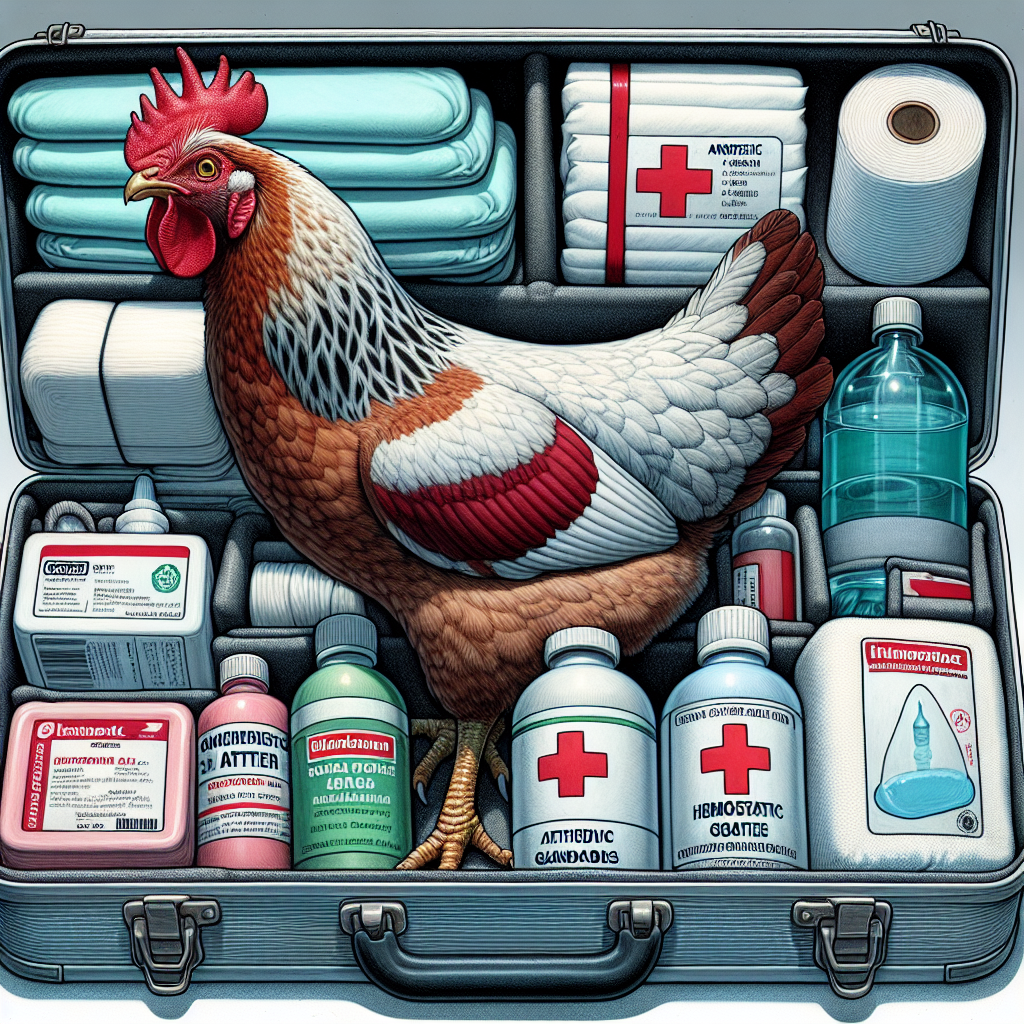If you’re a chicken owner, you know that ensuring the health and well-being of your flock is of utmost importance. But when your chickens fall ill, it can be a worrisome and uncertain time. That’s why it’s crucial to know how to ensure prompt and appropriate veterinary care for your sick chickens. In this article, we will explore some practical tips and guidelines to help you navigate the process and ensure that your feathered friends receive the best care possible. From recognizing common chicken illnesses to finding an experienced avian veterinarian, we’ve got you covered. So, let’s dive in and learn how you can take care of your sick chickens in the best way possible.
Recognizing signs of illness in chickens
Chickens, like any other living creatures, can sometimes fall ill. As a responsible chicken owner, it’s essential to be able to recognize the signs of illness in your flock so that you can take prompt action and provide appropriate veterinary care. Pay close attention to any physical symptoms or behavioral changes that may indicate that one of your chickens is unwell.
Physical symptoms of illness
Physical symptoms are often the first indication that something is wrong with a chicken. Keep an eye out for the following signs:
- Abnormal droppings: If you notice a sudden change in the color, consistency, or frequency of your chicken’s droppings, it could be a sign of an underlying health issue.
- Respiratory issues: Wheezing, coughing, sneezing, or any other difficulty breathing should be taken seriously and investigated further.
- Weight loss: If a chicken is losing weight rapidly or appears thin, it could be an indication of an underlying illness.
- Feather abnormalities: Observe your chicken’s feathers for any signs of molt delay, excessive feather loss, or changes in feather appearance.
- Sores or lesions: Look for any open wounds, sores, or abnormal growths on your chicken’s body.
- Lethargy: A sudden lack of energy or a noticeable decrease in activity level can be a sign that a chicken isn’t feeling well.
Behavioral changes
In addition to physical symptoms, chickens may also exhibit behavioral changes that could indicate illness. Keep an eye out for the following behaviors:
- Decreased appetite: If a chicken is refusing to eat or drink, it may be an indication of a health problem.
- Isolation: Chickens are social animals, so if one of your chickens starts isolating itself from the rest of the flock, it may be a sign that it’s feeling unwell.
- Changes in vocalization: If a normally chatty chicken suddenly becomes quiet or starts making unusual sounds, it may be trying to communicate distress.
- Reduced egg production: A sudden drop in egg production or the presence of abnormal eggs can indicate health issues in a laying hen.
- Abnormal behavior: Any unusual or abnormal behavior that deviates from your chicken’s normal routine should be noted and investigated further.
Finding a reputable veterinarian
When you suspect that one of your chickens is sick, it’s crucial to seek professional help from a reputable veterinarian who has experience with poultry. Here’s how you can find a trustworthy veterinarian in your area:
Ask for recommendations
Reach out to fellow chicken owners, local farmers, or poultry enthusiasts for recommendations. Word-of-mouth referrals are valuable as they often come from firsthand experiences. Ask about their experiences with veterinarians in your vicinity and inquire about their satisfaction with the veterinary care they received.
Research local veterinary clinics
Do some research online or consult directories that specialize in veterinary services for farm animals. Look for clinics that explicitly mention their experience with poultry and veterinary professionals who have a background in avian medicine. Check for reviews or testimonials to gather insights into the quality of care provided by the veterinarians you are considering.
Once you have a few potential options, it’s time to contact the veterinarian of your choice.
Contacting the veterinarian
Before making an appointment, it’s essential to have a conversation with the veterinarian or their clinic to ensure they can provide the appropriate care for your sick chicken.
Describe the symptoms
When contacting the veterinarian, clearly describe the physical symptoms and behavioral changes you have observed in your chicken. Be as specific as possible and provide any additional details that might be relevant. This information will help the veterinarian assess the situation and determine the urgency of the visit.
Ask about the veterinarian’s experience with chickens
While on the call, don’t hesitate to ask about the veterinarian’s specific experience with poultry, especially chickens. Find out how many chicken cases they have handled, what kind of illnesses they are familiar with, and if they have any particular areas of expertise related to chicken health. It’s important to choose a veterinarian who has adequate knowledge and experience with chickens to ensure the best care for your feathered friend.
Preparing for the veterinary visit
Before taking your sick chicken to the veterinarian, take some preparatory steps to ensure a smooth and stress-free visit.
Gather important information
Compile all relevant information about your chicken’s health, including details about its breed, age, diet, and any previous health issues. Additionally, make note of any medications or supplements your chicken is currently receiving. Having this information readily available will help the veterinarian better understand your chicken’s medical history and make an accurate diagnosis.
Set up a clean and safe transportation carrier
Prepare a clean and secure carrier to transport your chicken to the veterinarian. Use a well-ventilated crate or carrier that provides enough space for your chicken to move comfortably. Line the bottom with clean bedding or towels to keep the chicken comfortable during the journey. Ensure the carrier is securely closed to prevent any escapes or injuries while on the move.
Transporting the sick chicken
Transporting a sick chicken requires care and attention to minimize stress and ensure their comfort throughout the journey.
Handle with care and minimize stress
When handling your sick chicken, be gentle to minimize any discomfort or pain. Pick it up properly, supporting its body and wings, and avoid sudden movements or jostling. Minimize noise and commotion during transportation to provide a calm environment, which can reduce stress levels.
Ensure proper ventilation and temperature control
Maintain proper ventilation in the carrier to ensure the chicken has access to fresh air during transit. However, be cautious to avoid exposing the chicken to cold drafts or excessive heat. Keep the carrier away from direct sunlight and make sure it is securely closed to maintain a suitable temperature inside.
The veterinary examination
During the veterinary examination, the veterinarian will assess your chicken’s overall health and perform various tests to make an accurate diagnosis. It’s essential to understand what to expect during this examination.
Physical examination
The veterinarian will conduct a thorough physical examination of your chicken, checking for any abnormalities in the feathers, skin, eyes, ears, beak, and vent. They will also palpate the abdomen to identify any signs of tenderness or organ enlargement. Additionally, they may listen to the chicken’s heart and lungs with a stethoscope to check for any abnormal sounds.
Diagnostic tests
In some cases, the veterinarian may recommend running diagnostic tests to gain a deeper understanding of your chicken’s health condition. These tests may include blood work, fecal analysis, bacterial cultures, or X-rays. Diagnostic tests can provide valuable insights and help the veterinarian in making a definitive diagnosis.
Understanding the diagnosis
Upon receiving the diagnosis from the veterinarian, it’s important to fully understand the condition and its implications for your chicken’s health. Don’t hesitate to ask questions to ensure clarity and gain a better understanding of the situation.
Ask questions to clarify
Ask the veterinarian to explain the diagnosis in simple terms and elaborate on the cause of the illness. Inquire about the potential outcomes, both positive and negative, and any long-term implications for your chicken’s health. Understanding the diagnosis will enable you to make informed decisions regarding treatment and care.
Discuss treatment options
Engage in a discussion with your veterinarian about the available treatment options for your chicken. Inquire about the effectiveness and potential side effects of each option. Discuss any alternative therapies or medications that may be suitable for your chicken’s condition. Together with your veterinarian, decide on the best course of action to ensure your chicken’s well-being.
Administering prescribed medication
Once the veterinarian prescribes medication for your sick chicken, it’s essential to carefully follow their instructions.
Follow vet’s instructions
Ensure you understand the dosage, frequency, and duration of the prescribed medication. Follow the veterinarian’s instructions precisely to maximize the effectiveness of the treatment. If you have any doubts or concerns, don’t hesitate to reach out to your veterinarian for clarification.
Methods of administration
Ask the veterinarian about the best method of administering the medication to your chicken. Options may include adding it to their water, mixing it with their feed, or administering it directly into their mouth. Follow proper handling and safety protocols to avoid any risks or injuries to yourself and your chicken.
Monitoring the chicken’s progress
After starting treatment, it’s crucial to closely monitor your chicken’s progress to ensure they are responding well and recovering.
Observing behavior and symptoms
Keep a close eye on your chicken’s behavior, paying attention to any changes or improvements in their overall demeanor. Observe their eating, drinking, and egg-laying habits. Monitor for any recurrence of symptoms or the emergence of new ones. Document any significant observations to share with your veterinarian during follow-up visits.
Keeping a record
Maintain a detailed record of your chicken’s progress, including dates of medication administration, changes in symptoms, and any additional care provided. This record will help you track their recovery and provide valuable information to your veterinarian during future consultations. It’s also a helpful resource if you decide to seek a second opinion or consult with other chicken owners facing similar challenges.
Promoting overall chicken wellbeing
In addition to providing veterinary care, it’s crucial to focus on promoting your chicken’s overall wellbeing to prevent future illnesses.
Proper nutrition and hydration
Ensure your chickens have access to a balanced diet that meets their nutritional requirements. Offer a variety of high-quality feeds, including grains, seeds, and greens. Provide clean and fresh water at all times. Supplement their diet with grit to aid digestion and calcium for strong eggshells. Well-nourished chickens are more resilient to diseases and infections.
Providing appropriate housing and space
Create a healthy and comfortable living environment for your chickens. Provide adequate shelter to protect them from extreme weather conditions, predators, and disease vectors. Allow sufficient space for them to move around, stretch their wings, and engage in natural behaviors. Keep their coop and bedding clean and regularly inspect for signs of parasites or other potential health hazards.
By being proactive in recognizing signs of illness, finding a reputable veterinarian, and providing prompt and appropriate care, you can ensure the health and well-being of your sick chickens. Remember, as a chicken owner, you play a vital role in their welfare and overall quality of life.




